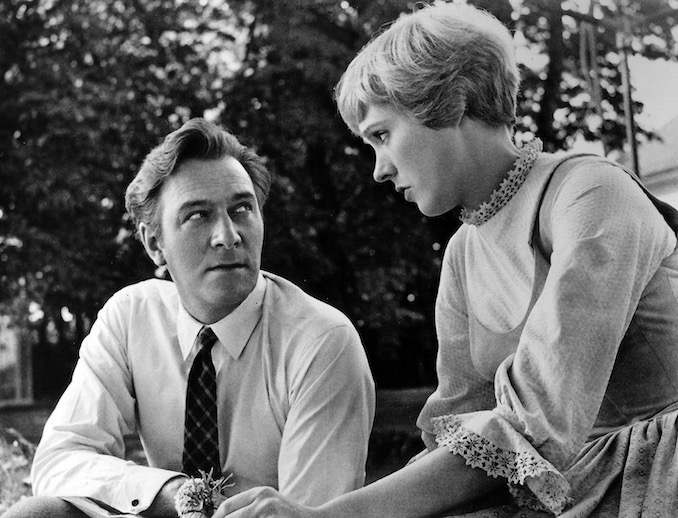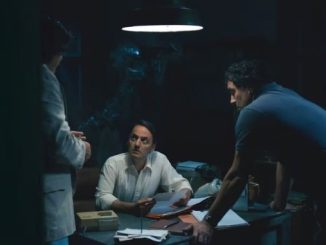Christopher Plummer, the Toronto-born, ambiguously accented legend of stage and screen, has died at the age of 91. A rare holder of the Acting Triple Crown – an Academy Award (for Beginners, 2012), a Tony Award (in fact, two, for Cyrano, 1974 and later Barrymore, 1997), and an Emmy (also twice, for The Moneychangers, 1997 and for voice-acting in Madeline, 1994) – he appeared in over 100 films, 70 TV series, and dozens of plays in a career spanning seven decades. He was the oldest actor to ever win an Oscar (at age 82 for Beginners), and the oldest to ever be nominated (at 88, for All the Money in the World, 2017).
Christopher Plummer was Captain Von Trapp, Sherlock Holmes, Rudyard Kipling, and General Chang of the Klingon Empire. He was also (sigh) Santa Claus, Ebenezer Scrooge, and Aristotle (in the dreadful Alexander). He had the best voice in Hollywood, which he could use to wonderful, dramatic effect – but he was not above hamming it up in junky roles, as those last three attest.
He was also Canadian, very much so. Born in Toronto, his first screen role was a CBC production of Othello, and he was lifelong friends with William Shatner. He was the great-grandson of our third prime minister, Sir John Abbott. And he was one of our most successful Hollywood exports, an acting legend whose name can be uttered in the same breath as, say, Mary Pickford. It is not just Canada who is mourning the loss of a screen icon – the whole world mourns with us.

Christopher Plummer never stopped acting, and his final film roles, all released in 2019, act as an appropriate encapsulation of the kind of career he had. Knives Out, an Oscar-nominee, saw Plummer in fine form as the beleaguered patriarch of a literally and metaphorically backstabbing family. Cliffs of Freedom and The Last Full Measure, in comparison, are well-meaning but middling revisionist historical dramas, resembling a few too many entries in his expansive filmography. Why Plummer, at the age of 89, agreed to appear in the latter two can be explained easily enough: it was a chance to act, and he loved acting. And if it wasn’t always serious dramatic legwork, he at least got to have a bit of twinkle-eyed fun.
Plummer was born in Toronto and grew up in an affluent Montreal suburb, making him, like any good Canadian, fluently bilingual. Already acting in high school, he never attended college – something he would later speak of with regret – his youthful success landing him significant supporting roles first on Canadian stages and then on Broadway. In 1959, at the age of 30, he landed his two first major nominations – at the Tonys, a Best Actor nod for J.B. (he lost to Jason Robards), and, at the Emmys, a Best Single Performance nomination for the teleplay “Little Moon of Alban” (he lost to, of all people, Fred Astaire). He would go on to be nominated for a total of three Academy Awards, seven Tonys, seven Emmys, and a Grammy – a nominee-EGOT, if you will.
Plummer was an imposing presence, his deep baritone and sorta-impressive height (he was 5’10”, though he always loomed larger whenever you saw him) lending him the type of dignified stateliness normally reserved for Grand Ole British Thespians like Christopher Lee or Ian McKellen (who landed the part of Gandalf after Plummer turned it down).
A skilled actor, Plummer undoubtedly benefited from a cultivated mid-Atlantic accent that obfuscated his Canadian roots. This was particularly so on stage: he was a featured player at the Stratford Festival, on Broadway, London’s National Theatre (under the direction of his acting idol, Laurence Olivier), and at the Royal Shakespeare Company in roles such as Henry V, Iago, Macbeth, Hamlet, Marc Antony, Prospero, and, inevitably, King Lear. Arguably, there has been no other non-British actor with as successful a Shakespearean career as Plummer.
I recently learned that Plummer was the first to play King Henry II in the London production of Becket (1961), a role originated only a year earlier by the one-two combo of Laurence Olivier and Anthony Quinn. Plummer had hoped to bring the role to the big screen, only to be crestfallen when Peter O’Toole beat him for the part in the film adaptation.
Olivier, Quinn, O’Toole. That’s impressive company to keep, and in his very, very long career Plummer would share the stage with the likes of James Earl Jones, Julie Harris, Judith Anderson (forgotten now, but once considered the single greatest classical stage actress), and Bibi Andersson (known, incidentally, for her collaborations with another great actor who died recently). On screen, Plummer acted with pretty much everybody – often rising above the mediocre script or silly special effects of his lesser films.
Which brings us, of course, to Hollywood. Beginning with, what else, The Sound of Music, the role he hated to play (he was, notoriously, drunk for much of filming), hated to talk about (for decades, he referred to it as The Sound of Mucus), and only later grudgingly acknowledged that (a) the movie was not so bad, and (b) he was being kind of a jerk about it. I can’t really blame him, though: for an actor who had recently lost out on Becket, having to play straight man to Julie Andrews’s yodel and the worst kids on film, ever was probably not his idea of a major career move.
Except, of course, it was. Starring in the biggest box office hit of all time is no mean feat (a slot Music held until The Godfather overtook it), and Plummer’s career undoubtedly benefited. (He also became fast friends with Julie Andrews, so it could not have been all bad.) That said, he never quite carved out a leading man career for himself, in the way many of his contemporaries did. More than a few obituaries have described him as a career supporting actor, which, on film, is probably true, though it discounts his important stage work.
What a supporting career he had, though: Best Picture winners The Sound of Music and A Beautiful Mind, and Best Picture nominee The Insider. Work with Terry Gilliam (12 Monkeys and Doctor Parnassus), Spike Lee (Malcolm X and Inside Man), and Terrence Mallick (The New World). He also had a significant career back home, appearing in Best Picture Genie Award Winners The Silent Partner (1978), as a violent mall Santa(!) stalking Elliott Gould, and in Atom Egoyan’s Ararat (2002), as a sympathetic Border Services Officer. In fact, Plummer’s last proper starring role was in another Egoyan film – the 2015 exploitation thriller Remember, in which Plummer played, what else, an octogenarian Nazi hunter.
But if I had to pick one Canadian-adjacent role for Plummer’s most memorable, I’d have to go with his Shakespeare-quoting General Chang in Star Trek VI: The Undiscovered Country, opposite fellow Canuck William Shatner. While the film’s Shakespeare references – including its title – predate the casting of Plummer, those aspects were greatly expanded once he joined the film as the central villain. The scenes of General Chang and Captain Kirk verbally sparring are entertaining enough, but carry extra significance once you learn that Shatner understudied for Plummer’s Henry V at the 1956 Stratford Festival. When Plummer fell ill with kidney stones, Shatner stepped in on short notice, earning rave reviews. There is general consensus among both Trek and Stratford historians that the Stratford Henry V, itself a major stepping stone in Plummer’s burgeoning career, was also Shatner’s first big break.
From fleeing Nazis in post-Anschluss Austria to hunting them in 21st century Canada, from swapping roles with Bill Shatner in rural Ontario to trading barbs with Captain Kirk in outer space, Plummer had one of the most lengthy and interesting careers of any of the great actors, Canadian or not. We will miss his voice, and that twinkle in his eye, but we can revisit them again and again, on screens big and small, in musicals and space operas and everything in between.
As a great Klingon general once said,
Our revels now are ended. These our actors,
As I foretold you, were all spirits and
Are melted into air, into thin air:
And, like the baseless fabric of this vision,
The cloud-capp’d towers, the gorgeous palaces,
The solemn temples, the great globe itself,
Yea, all which it inherit, shall dissolve
And, like this insubstantial pageant faded,
Leave not a rack behind. We are such stuff
As dreams are made on, and our little life
Is rounded with a sleep.



